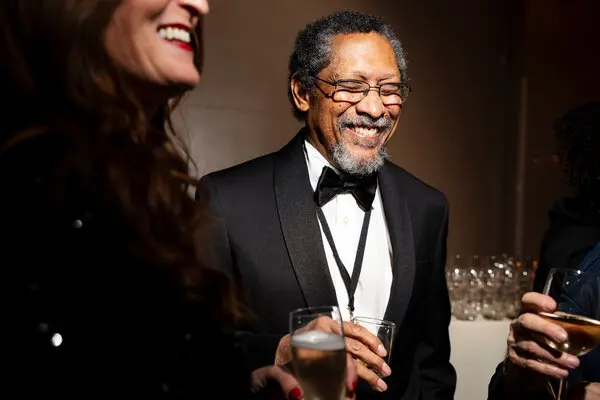By Alexander Alter
Percival Everett won the National Book Award for fiction on Wednesday for his novel “James,” a propulsive and slyly funny retelling of Mark Twain’s “Adventures of Huckleberry Finn” from the perspective of Huck’s companion, an enslaved man named James.
In accepting the award, Everett said that seeing people coming together to celebrate books gave him a sense of optimism during what was, for him, a challenging moment.
“Two weeks ago, I was feeling pretty low, and to tell you the truth, I still feel pretty low,” he said, in an oblique reference to the results of the presidential election. “As I look out at this, so much excitement about books, I have to say, I do feel some hope.”
Published this spring, “James” drew rapturous reviews from critics. “It is a tangled and subversive homage, a labor of rough love,” Dwight Garner wrote in The New York Times, calling the novel a masterpiece that deserves to be read alongside the book that inspired it.
This year’s award ceremony, which drew 800 guests to a black-tie dinner at Cipriani Wall Street, marked the 75th National Book Awards.
The event kicked off with a piano riff on Beethoven’s Fifth symphony by Jon Batiste, the Grammy Award and Academy Award-winning singer, songwriter and composer.
He was followed by Kate McKinnon, a comedian and actress who hosted the event and joked about her lack of literary credentials in the opening remarks. After describing the power of books to illuminate, provoke and inspire change, she confessed that the line was written by ChatGPT. “Is that bad?” she asked.
Even with McKinnon’s jokes and frequent whoops of delight, the mood often turned somber, as writers spoke about the role of literature in challenging times, with ongoing wars, political division, racial inequality and growing book removals around the country.
“Hard times are coming,” said Ruth Dickey, executive director of the National Book Foundation, quoting a speech given by Ursula K. Le Guin at the National Book Awards in 2014, as she described the threat of rising censorship and book bans.
The award for nonfiction was given to the anthropologist Jason De León for “Soldiers and Kings: Survival and Hope in the World of Human Smuggling,” an immersive account of the nearly seven years he spent embedded with human smugglers on the U.S.-Mexico border. The book depicts traffickers as both victims and perpetrators of violence, often suffering from the same poverty as migrants.
In accepting the award, which he dedicated to “everyone on the migrant trail,” De León denounced the incoming Trump administration’s proposed crackdown on immigration and other policies. “I will not accept the dystopian American future,” he said.
The National Book Award, established in 1950, is one of the most prestigious literary prizes in the United States. Past winners include William Faulkner, Flannery O’Connor, Ralph Ellison, Louise Erdrich, Colson Whitehead and Jesmyn Ward.
The prize, which is given in five categories — fiction, nonfiction, poetry, translated literature and young people’s literature — is open to books released by U.S. publishers in the United States between Dec. 1, 2023 and Nov. 30, 2024. Earlier this year, the National Book Foundation announced that it was dropping the citizenship requirement, opening up the prize to immigrants and others who have made their home in the United States.
The National Book Foundation also recognized Barbara Kingsolver, the author of nine novels, including “The Poisonwood Bible” and “Demon Copperhead,” which won the 2023 Pulitzer Prize, with a lifetime achievement award.
In accepting the prize, Kingsolver made a case for morally engaged literature that raises uncomfortable questions about social inequality and injustice. “I think we’re at our best when we’re disruptors, when we rattle self absorption,” she said. “We get to crack people open.”
The foundation also honored W. Paul Coates, publisher and founder of Black Classic Press and BCP Digital Printing, with the Literarian Award, which recognizes service to the literary community.
Coates’s award provoked controversy after an article in Jewish Insider questioned the foundation’s decision, noting that Black Classic Press had republished the late Tony Martin’s 1993 book “The Jewish Onslaught,” which was criticized as antisemitic at the time of its publication for Martin’s claims that Jewish people were opposed to Black progress.
The foundation defended its choice in a statement to Jewish Insider, noting that they awarded the prize to Coates for his work “to ensure that Black voices and stories, that might otherwise have been lost, are instead preserved as an irreplaceable part of American literary history.” On Wednesday night, Coates received the award to warm applause and without incident, and spoke about the purpose of his press.
“My mission is recovery, and making Black self-narrating voices known to the world,” he said.
The award for translated literature, which was added in 2018, went to Yáng Shuāng-zǐ’s “Taiwan Travelogue.” The novel, about a Japanese novelist who travels to Taiwan in 1938 and forms a relationship with her young female interpreter, was translated from Mandarin by Lin King.
The award for young people’s literature was given to Shifa Saltagi Safadi for “Kareem Between,” a coming-of-age novel that centers on a Syrian American boy struggling to fit in. In her acceptance speech, Safadi thanked Allah and the Muslim writers who had come before her, and denounced the “dehumanization of Arabs and Islamophobia,” as well as the war in Gaza.
The poetry prize was awarded to Lena Khalaf Tuffaha for “Something About Living,” a collection that explores the erasure of Palestinian history. Tuffaha, who decried the ongoing violence in Gaza, said that she was honored to accept the award as a Palestinian American on “behalf of all the deeply beautiful Palestinians that this world has lost, and in honor of all the miraculous ones who endure.”



